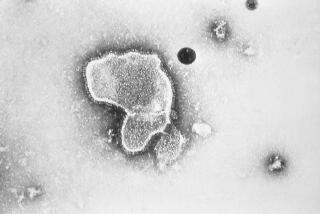CHOC Slates Notification on AIDS Risk From Blood
- Share via
Childrens Hospital of Orange County, which promised in December to notify the parents of children who may have received AIDS-tainted blood, will begin sending notice letters in September, a hospital spokeswoman said.
The hospital in Orange, which experts said is the first in Southern California to undertake such an independent notification program, will send up to 1,000 letters to parents, notifying them that their child received a blood transfusion in 1978-84, said Maureen Williams, the hospital’s director of public relations. Because widespread screening of blood for antibodies to the AIDS virus did not begin until March, 1985, hospital officials said parents will be advised that any child who received blood products during that period may have been exposed to acquired immune deficiency syndrome.
“We’re not trying to create fear,” Williams said. “(Parents) should be aware of the facts and let the family doctor decide if they (the children) need to be tested.”
Williams said workers examined 16 volumes of blood records from 1978-83, kept by St. Joseph Hospital, which supplied blood products to neighboring CHOC during the period. Those records contain about 200,000 handwritten notations on children and adults who received blood at CHOC and St. Joseph.
Workers expect to find about 3,000 children--or more than 400 for each of the seven years--who received blood products during that period, based on previous annual averages, Williams said.
“It is much more overwhelming than we thought when we first said we would do it,” she said about the intricacy and magnitude of the review.
Excluded from the mailing will be children who have died since their stay and 360 former patients who were already told in December, when their parents called the hospital inquiring about whether their child had been given AIDS-tainted blood.
Finally, those who are not eliminated from the list will receive a letter telling them of the possible exposure and stressing that they react with calm, said Dr. David Lang, the hospital’s chief of infectious diseases.
The proposed letter states: “Your child has been identified as one who has received blood products during (1978-84). I will try to explain something about the risk.”
It goes on to state that the chance of exposure is minimal and that a confidential, free AIDS testing program has been set up with the county.
Lang said the process of determining which patients received blood products is a “public service” conducted at the hospital’s expense.
“I don’t believe there is another hospital in the area that has looked at all their records like this,” he said.
Other area hospitals also may have received AIDS-tainted blood, said Sylvia Stewart, spokeswoman for the county chapter of the American Red Cross, which gathers and disseminates 95% of the county’s blood supply. As part of its Lookback Program, the American Red Cross has identified 44 units of potentially tainted blood that went to area hospitals. Stewart, who would not name the hospitals, said the 44 units in question came from donors who later gave blood that tested positive for AIDS antibodies.
The only other hospitals that have notification programs similar to CHOC’s are checking as part of a research grant, said Dr. Thomas Prendergast, the county’s epidemiologist.
More to Read
Sign up for Essential California
The most important California stories and recommendations in your inbox every morning.
You may occasionally receive promotional content from the Los Angeles Times.













